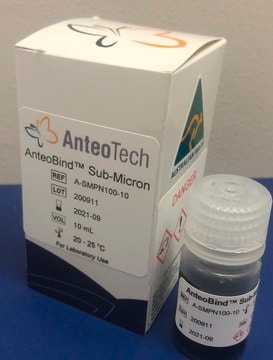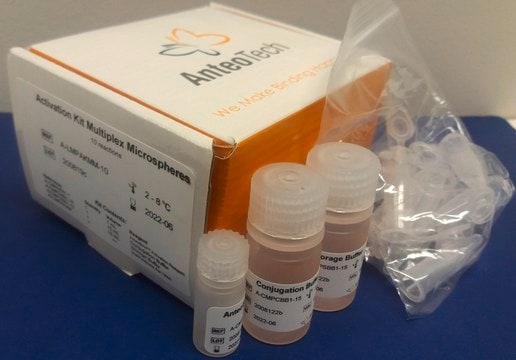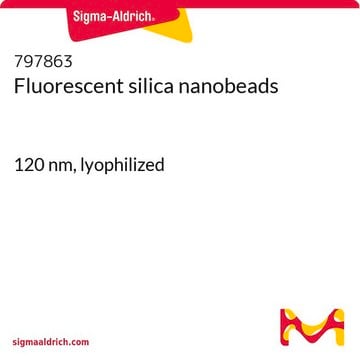Recommended Products
form
liquid
availability
not available in Japan
Related Categories
General description
AnteoBind Biosensor is a ready-to-use activation reagent specifically developed for binding biomolecules onto planar surfaces including polystyrenes, certain cyclic olefin copolymers, microarray slides, silicon oxides, titanium oxides, ceramics and gold surfaces (excluding gold colloids in suspension).
AnteoBind Biosensor can modify the strength of binding, wettability and surface charge of base materials commonly used in biosensor applications. By using AnteoBind surface coatings, it is possible to control protein binding and improve the stability of bound biomolecules across a range of surfaces used in biosensors.
AnteoBind Biosensor has many advantages over methods such as EDC. AnteoBind is water based and replaces the dry chemicals you would use with the EDC method. Using AnteoBind instead of NHS/EDC chemistry can save up to 3-4 hours of lab time. Experiments have shown increased stability and functionality for antibodies and a decreased background. AnteoBind improves reproducibility between experiments by providing uniformity between surfaces.
AnteoBind Biosensor can modify the strength of binding, wettability and surface charge of base materials commonly used in biosensor applications. By using AnteoBind surface coatings, it is possible to control protein binding and improve the stability of bound biomolecules across a range of surfaces used in biosensors.
AnteoBind Biosensor has many advantages over methods such as EDC. AnteoBind is water based and replaces the dry chemicals you would use with the EDC method. Using AnteoBind instead of NHS/EDC chemistry can save up to 3-4 hours of lab time. Experiments have shown increased stability and functionality for antibodies and a decreased background. AnteoBind improves reproducibility between experiments by providing uniformity between surfaces.
Application
Activation and coupling of biosensor planar surfaces
Features and Benefits
- Water based, activation and coupling reagent for biosensor planar surfaces
- Modify the strength of binding, wettability and surface charge of base materials
- An alternative to traditional chemistries such as NHS/EDC methods with an easier to use protocol
- Reduce reagent preparation time by 3-4 hours
- Increase antibody functionality
- Low background noise
- High reproducibility between experiments
Legal Information
Anteobind is a trademark of AnteoTech Ltd
Storage Class Code
12 - Non Combustible Liquids
WGK
WGK 3
Flash Point(F)
Not applicable
Flash Point(C)
Not applicable
Choose from one of the most recent versions:
Certificates of Analysis (COA)
Lot/Batch Number
Sorry, we don't have COAs for this product available online at this time.
If you need assistance, please contact Customer Support.
Already Own This Product?
Find documentation for the products that you have recently purchased in the Document Library.
Marco Lindner et al.
Frontiers in chemistry, 6, 655-655 (2019-02-09)
Protein micropatterning has become an important tool for many biomedical applications as well as in academic research. Current techniques that allow to reduce the feature size of patterns below 1 μm are, however, often costly and require sophisticated equipment. We
Jiao Wu et al.
Advanced functional materials, 26(22), 4016-4025 (2016-08-16)
We for the first time demonstrate multi-functional magnetic particles based rare cell isolation combined with the downstream laser desorption/ionization mass spectrometry (LDI-MS) to measure the metabolism of enriched circulating tumor cells (CTCs). The characterization of CTCs metabolism plays a significant
Our team of scientists has experience in all areas of research including Life Science, Material Science, Chemical Synthesis, Chromatography, Analytical and many others.
Contact Technical Service







